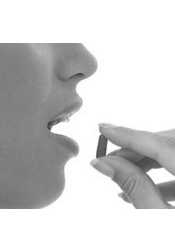Alunbrig® tablets
This product is manufactured by Takeda Canada using the ingredient brigatinib.
This product is taken orally.

play
orally
Why is it prescribed?
Brigatinib is used for locally advanced (not amenable to curative-intent therapy) or metastatic, non-squamous, anaplastic lymphoma kinase (ALK)-positive non-small cell lung cancer (NSCLC) as a first-line treatment, including
patients who have stable brain metastases.
Take with or without food.
Swallow the tablets whole. Do not crush or chew tablets.
If you miss a dose of Alunbrig, do not take the missed dose. Take your next dose at your regular time.
If you vomit after taking a dose, do not take an extra dose. Take your next dose at your regular time.
Avoid eating grapefruit or drinking grapefruit juice during treatment with Alunbrig. Grapefruit may increase the amount of the medication in your blood.
Store at room temperature between 20°C to 25°C.
Alternatives
See other products used in the treatment of •non-small cell lung cancer •
The recommended dosage is:
- 90 mg orally once daily for the first 7 days;
- If 90 mg is tolerated during the first 7 days, increase the dose to 180 mg orally once daily.
Brigatinib is a Protein Kinase Inhibitor (L01XE). In non-small cell lung cancer caused by a change in a gene called anaplastic lymphoma kinase (ALK-positive NSCLC)), brigatinib may slow down its growth and spread.
The most common side effects of brigatinib are: diarrhea, fatigue, nausea, rash, cough, muscle pain, headache, high blood pressure, vomiting and difficulty breathing.
Brigatinib can cause a number of serious side effects that should be investigated right away:
- Lung problems - trouble breathing or shortness of breath, chest pain, cough with or without mucus
- High blood pressure
- Slow heart rate (bradycardia)
- Vision problems
- Muscle pain, tenderness, and weakness (myalgia)
- Inflammation of the pancreas (pancreatitis)
- Liver problems
- High blood sugar
Brigatinib may also cause fertility problems in males and sun sensitivity. Limit time in the sun during treatment and for at least 5 days after final dose. When in the sun, wear a hat and protective clothing, and use a broad-spectrum sunscreen and lip balm with a Sun Protection Factor (SPF) of 30 or greater to protect against sunburn.
Do not use brigatinib if:
- you are allergic to it or any of the other ingredients in the tablet
Use brigatinib with caution if you:
- have problems with your lungs or problems breathing
- have problems with your heart including slow heart rate
- have problems with high blood pressure
- are taking medicines to lower your blood pressure or control your heart rate
- have problems with your vision
- have problems with your muscles including muscle pain, tenderness, or weakness
- have or have had problems with your pancreas
- have or have had problems with your kidneys
- have or have had problems with your liver
- have diabetes or high blood sugar
Drug Interactions: Check with your physician or pharmacist if you are on
- ketoconazole, itraconazole, voriconazole, fluconazole
- efavirenz, etravirine, indinavir, nelfinavir, ritonavir, saquinavir, cobicistat
- boceprevir, telaprevir
- clarithromycin, nafcillin, telithromycin, troleandomycin, ciprofloxacin, erythromycin
- bosentan, diltiazem, verapamil
- drugs that lower heart rate
- St. John’s wort
- ergot alkaloids
- fentanyl
- modafinil
- carbamazepine
- phenobarbital, phenytoin
- quetiapine
- rifabutin, rifampicin
- digoxin
- dabigatran
- colchicine
- pravastatin, rosuvastatin, simvastatin
- methotrexate
- sulfasalazine
- cyclosporine
- sirolimus, tacrolimus
- metformin
- estrogen, progestogen
- grapefruit and grapefruit juice
Safety in pregnancy: Brigatinib can cause harmful effects to the fetus. Females who are able to become pregnant should use effective birth control during treatment and for at least 4 months after the final dose of brigatinib.
Males who have female partners who are able to become pregnant should use effective birth control during treatment with brigatinib and for at least 3 months after the final dose.
Safety in breastfeeding: It is not known if brigatinib passes into breast milk. Do not use while breast feeding and for at least 1 week after stopping treatment.
